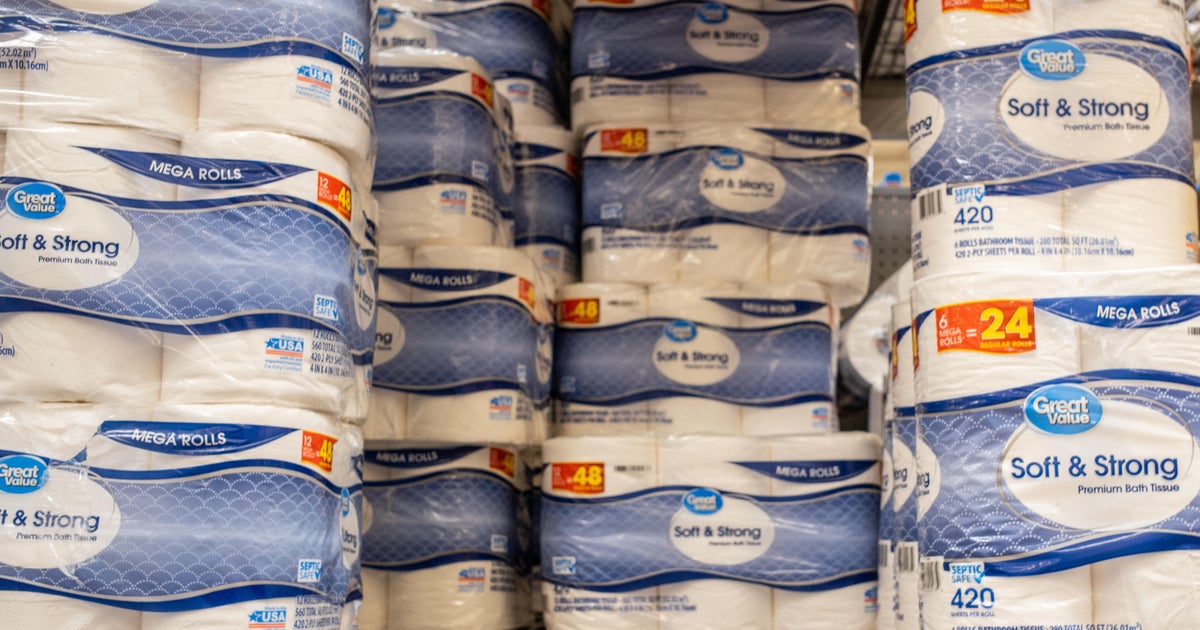CBS News
Is toilet paper affected by the port strike? Here’s what to know before panic-buying supplies.

As the port strike continues into its third day, some consumers are growing concerned about whether it could lead to a toilet paper shortage, prompting some to whisk supplies of the product off store shelves. But experts say there’s no need to worry about a shortage of toilet paper because the bulk of it is manufactured in the U.S.
Some consumers on Thursday posted images of empty shelves at major retailers, with some noting that shoppers are stuffing their carts full of toilet paper rolls. For some, the images suggest a replay of the pandemic’s impact in 2020, when supply chain problems caused by the health emergency led to actual shortages of toilet paper and other products.
“You guys … toilet paper hoarding of 2020 just made a comeback!” one shopper wrote on X, the former Twitter. “Two Costcos were sold out of the Kirkland brand. Everyone in line had 2 packages and one guy had 8!! Seriously people, please don’t do this again…”
But experts say the situation is different with the dockworker strike, which has shut down 14 ports along the East and Gulf coasts since Tuesday. The labor dispute isn’t likely to impact toilet paper or many other supermarket products, such as meat and breakfast cereal, because they’re largely produced domestically, Michigan State University professor Jason Miller told CBS News.
“This is where it’s just very important for folks to understand this is a completely different situation than a worldwide pandemic that we didn’t know what we were facing, you know, four and a half years ago,” Miller, a supply chain expert, said. “There’s no reason to panic by because of this port strike. You know, things will be okay.”
About 85% of U.S. tissue paper demand, including toilet paper, paper towels, napkins and facial tissue, is supplied by U.S. tissue producers, according to a statement from the American Forest & Paper Association, a trade group for the paper and wood product industry.
“The American Forest & Paper Association is aware of reports of toilet paper shortages, which some have attributed to the current port strike,” Heidi Brock, the group’s CEO, said in a statement emailed to CBS MoneyWatch.
She added, “While we continue to urge the [International Longshoremen’s Association] and USMX to quickly bring an end to this strike to restore our members’ access to export their products, we would like to stress we are not aware of any expected impact to tissue product delivery in the U.S.”
Could stores impose toilet paper limits?
Ironically, panic-buying or hoarding could create shortages of toilet paper or other products, even though there’s little risk of shortfalls due to the port strike, Miller said.
“I do think the retailers again are gonna clamp down on things very quickly,” Miller noted. “It would be very useful if some of the big retailers would come out and make some public statements on this. You know, Walmart, Target, Costco coming out and saying, ‘There’s ample supplies, we’re putting limits on this, stop doing it.'”
Walmart, Target, Kroger and Publix did not immediately respond to requests for comment. Kimberly-Clark, the maker of Cottonelle and Scott brand products, said the port strike “is not currently impacting our ability to supply our paper products or other products.”
What items will be affected by the port strike?
That’s not to say that some items won’t be affected by the labor stoppage, especially if it stretches into weeks, rather than days. More than 100 categories of food, including bananas and chocolate, depend on the now-shuttered operations, while beverages such as imported beer and wine are also at risk of shortages if the strike continues.
For instance, it might become more expensive to buy bananas on the East Coast, or even find them. Imported wine might also become scarce, although there will still be plenty of wine on the shelves, given that the U.S. is a large manufacturer.
“If you’re on the East or Gulf coast, I would say enjoy bananas while you can get them. Because that is a situation where if this strike goes on three weeks, it will be much more difficult and or much more expensive to get bananas,” Miller noted.
Even so, much of what is consumed in the U.S. is manufactured domestically, he added.
“Even though there’s this narrative that we don’t manufacture anything in the United States, we actually do manufacture a tremendous amount of goods,” Miller said. “And especially the stuff on the supermarket, we do make that here, the soap and detergent that you’re using is manufactured here in the United States. You do not need to go buy a year supply right now thinking it’s coming from Europe.”
Nancy Chen and
contributed to this report.
CBS News
Dishing up space food – CBS News

Watch CBS News
Be the first to know
Get browser notifications for breaking news, live events, and exclusive reporting.
CBS News
In praise of Seattle-style teriyaki

Watch CBS News
Be the first to know
Get browser notifications for breaking news, live events, and exclusive reporting.
CBS News
Gazan chefs cook up hope and humanity for online audience

Renad Atallah is an unlikely internet sensation: a 10-year-old chef, with a repertoire of simple recipes, cooking in war-torn Gaza. She has nearly a million followers on Instagram, who’ve witnessed her delight as she unpacks parcels of food aid.
CBS News
We interviewed Renad via satellite, though we were just 50 miles away, in Tel Aviv. [Israel doesn’t allow outside journalists into Gaza, except on brief trips with the country’s military.]
“There are a lot of dishes I’d like to cook, but the ingredients aren’t available in the market,” Renad told us. “Milk used to be easy to buy, but now it’s become very expensive.”
I asked, “How does it feel when so many people like your internet videos?”
“All the comments were positive,” she said. “When I’m feeling tired or sad and I want something to cheer me up, I read the comments.”
We sent a local camera crew to Renad’s home as she made Ful, a traditional Middle Eastern bean stew. Her older sister Noorhan says they never expected the videos to go viral. “Amazing food,” Noorhan said, who added that her sibling made her “very surprised!”
After more than a year of war, the Gaza Strip lies in ruins. Nearly everyone has been displaced from their homes. The United Nations says close to two million people are experiencing critical levels of hunger.
Hamada Shaqoura is another chef showing the outside world how Gazans are getting by, relying on food from aid packages, and cooking with a single gas burner in a tent.
Shaqoura also volunteers with the charity Watermelon Relief, which makes sweet treats for Gaza’s children.
In his videos online, Shaqoura always appears very serious. Asked why, he replied, “The situation does not call for smiling. What you see on screen will never show you how hard life is here.”
Before dawn one recent morning in Israel, we watched the UN’s World Food Program load nearly two dozen trucks with flour, headed across the border. The problem is not a lack of food; the problem is getting the food into the Gaza Strip, and into the hands of those who desperately need it.
The UN has repeatedly accused Israel of obstructing aid deliveries to Gaza. Israel’s government denies that, and claims that Hamas is hijacking aid.
“For all the actors that are on the ground, let the humanitarians do their work,” said Antoine Renard, the World Food Program’s director in the Palestinian territories.
I asked, “Some people might see these two chefs and think, well, they’re cooking, they have food.”
“They have food, but they don’t have the right food; they’re trying to accommodate with anything that they can find,” Renard said.
Even in our darkest hour, food can bring comfort. But for many in Gaza, there’s only the anxiety of not knowing where they’ll find their next meal.
For more info:
Story produced by Mikaela Bufano. Editor: Carol Ross.
See also:
“Sunday Morning” 2024 “Food Issue” recipe index
Delicious menu suggestions from top chefs, cookbook authors, food writers, restaurateurs, and the editors of Food & Wine magazine.









